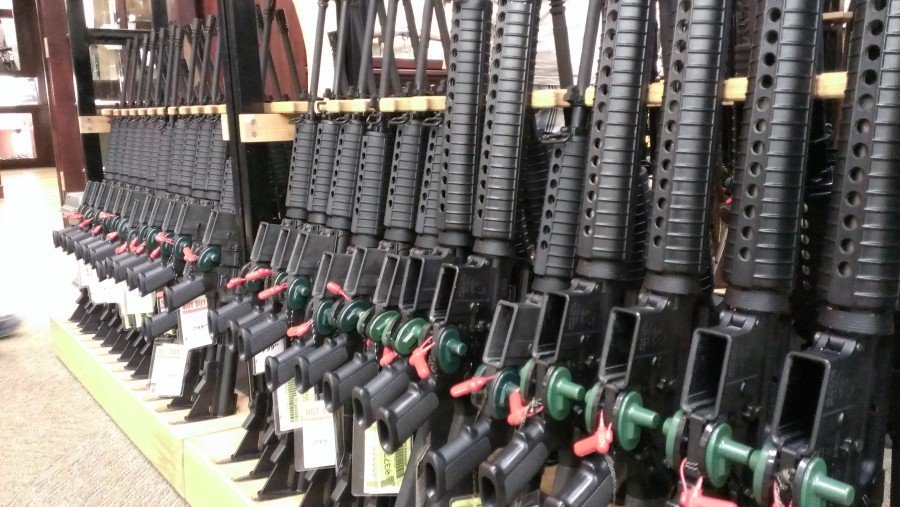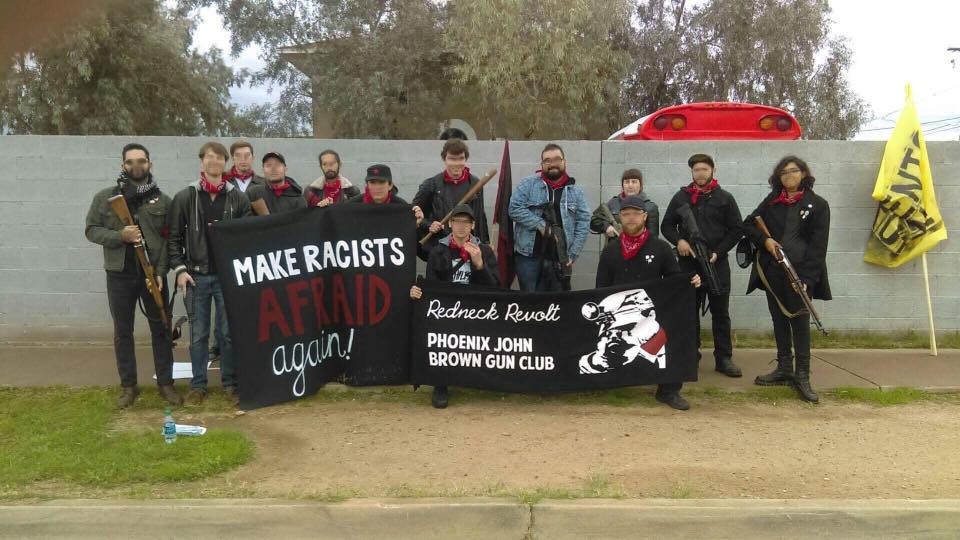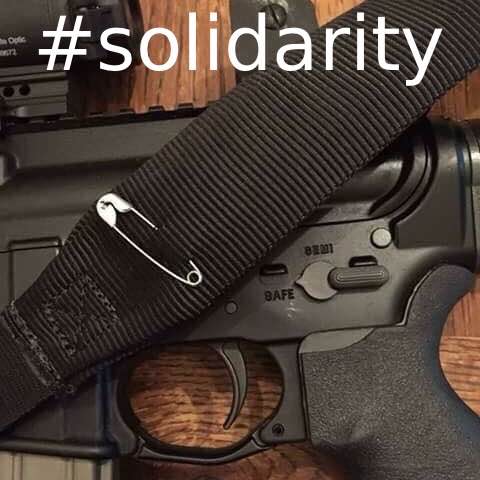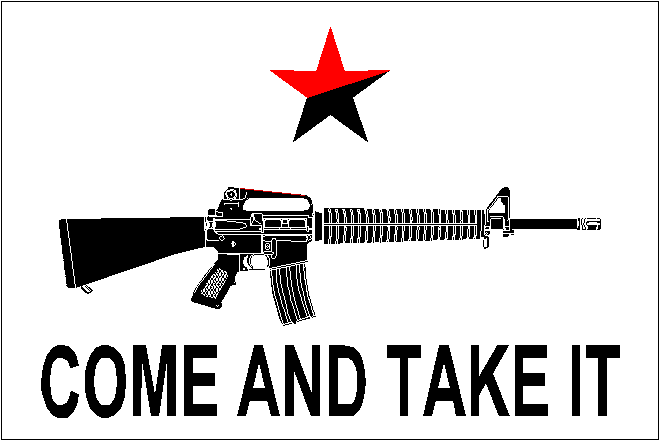Filed under: Anarchist Movement, Anti-fascist, The State, US

With the resurgence of fascism and right-wing violence against radicals, the topic of armed self-defense and gun ownership has become much more popular in radical communities. Traditional “Know Your Rights” trainings in radical and progressive circles have usually focused on the rights people have to protest or when interacting with law enforcement. It’s about time we start talking about exactly which rights the Second Amendment entails as well.
The United States Supreme Court has said that the Second Amendment enshrines the right of individuals to possess a firearm in their home for self-defense. That sounds nice and expansive, but as radicals are well aware, rights are seldom so absolute. So what are your rights with respect to possessing, purchasing, carrying and using firearms? What are some of the laws that restrict those rights?
Firearms laws are complicated, change often, and vary significantly from state to state and even city to city. (Unfortunately, one of the best resources for more information on state gun laws is the NRA website). This is a short overview to some of the main federal laws and a short discussion of some of the variability in state laws and issues that radicals should be aware of and research further. In this white supremacist, capitalist, hetero-patriarchy, people who don’t fit the typical profile of “legal gun owner” (basically anyone who doesn’t outwardly present as a middle-class white male) will likely encounter particular suspicion, scrutiny, or hostility for exercising their gun rights. Knowing the ins and outs what the law does or does not allow may be helpful, but the police murders of John Crawford and Philando Castille are painful reminders that legality and rights cannot always protect you.
Caution: This essay is NOT legal advice, or even a comprehensive guide to firearms laws across the United States. You are responsible for knowing the particular laws—federal, state, and local—that will apply to you. Specific questions about which laws apply to a particular situations should be directed to a competent attorney.
Possessing
Federal law (which covers everyone in every state) prohibits a number of classes of people from ever possessing firearms or ammunition in any circumstance, including:
- anyone convicted of any felony;
- anyone convicted of misdemeanor crimes of domestic violence or subject to a domestic violence restraining order;
- anyone who uses or is addicted to any controlled substance (this includes anyone who uses marijuana, even in states where it is legal);
- anyone who has ever been committed to a mental institution;
- unauthorized immigrants and immigrants in the U.S. on non-immigrant visas;
- anyone dishonorably discharged from the military;
- any US citizen who has renounced their citizenship. (18 U.S.C. § 922(g)).
Most states have their own laws with similar prohibitions.
This can present some tricky situations for folks living or organizing in collective spaces, since many people come from a variety of backgrounds. A shotgun in the front closet of a collective house could be said to be legally possessed by everyone who is living in the house, even temporarily. A pistol locked in a drawer or a safe could still be legally possessed by anyone who has the key or combination to the lock. Possession of a firearm by those prohibited from possessing them can carry a 10-year federal prison sentence. People in our communities and spaces must be informed of and agree to the possible risks they might face.
There is no federal ban or restriction for semi-automatic “assault weapons,” but a handful of states either regulate or completely prohibit them. Amongst these states, the definition of “assault weapon” varies, and often turns on very minute technical details of the firearm.
Fully automatic firearms are strictly regulated by federal law and require extensive background checks and licensing to own. The same goes for rifles and shotguns with short barrels (less than 16” for rifles and less than 18.5” for shotguns), as well as suppressors/”silencers.” Modifying a semi-automatic firearm to be fully automatic is almost always illegal. It is also illegal to possess a firearm that has the serial number destroyed or obscured.
Some states and cities (New York City is one easy example) have so many regulations and restrictions and permitting requirements that legal firearm ownership might simply not be a realistic possibility for radicals.

Purchasing
The process for legally buying a firearm varies by state. A few states require buyers to get a background check or license before they go to purchase a firearm, but most do not. Under federal law and many state laws, you are required to undergo a background check through the FBI at the time of purchase if you are buying a firearm from a dealer with a Federal Firearms License (FFL)—usually any sort of commercial retail store, firearm dealer, or pawn shop whether it is a big box store or mom and pop shop; a new or used firearm; or at the physical store, at their gun show table, or over the internet. Background checks are also required if you are buying or receiving the gun from anyone out of state.
However, under federal law and many state laws, you do not need to undergo a background check if you are buying a firearm from another private individual in your state. In these states, it is perfectly legal to respond to an ad in the newspaper, meet in a grocery store parking lot, exchange the cash and the firearm, and be on your way. But make sure you know your state laws before engaging in such a transaction.
It is illegal to purchase a firearm for another person—what is called a “straw purchase.” Federal background check paperwork asks whether the person filling out the paperwork is the end user or final transferee of the gun, and answering falsely is a crime. However, purchasing a firearm with the intent to later give or sell it to another person is not necessarily illegal provided that you are not buying the firearm at the request or direction of the person you plan you give or sell it to. The feds love sting operations in which an undercover requests that someone buy them a firearm because they don’t want the transaction to be “on paper.” This is a trap because such a purchase is illegal.
It is illegal to sell, give, or loan a firearm to someone that you know to be legally ineligible to possess one. So loaning your Glock to your friend who you know is a convicted felon can get you both in a lot of trouble.
There is no nation-wide registration of firearms. This means that when you purchase a firearm, information about you and the firearm you purchased does not go in some national database for easy, automated access. However, if a background check was conducted when you bought the firearm, the FBI has a record that the check was conducted, who requested it (the store, dealer, etc.), and what the result was. The store or dealer you bought it from will also retain a record of the sale which will include information about the specific firearm that was purchased (make, model, caliber, and serial number). In this way, the feds are able to laboriously trace gun purchases.
Private sales that are done in states that don’t require background checks for such sales might or might not have such paperwork. Some people want buyers to provide ID and a bill of sale to cover their asses. Others don’t care, but might still have phone or email records from the communications to arrange the sale.
Some states, however, do have statewide databases for who owns what guns.
You must be at least 18 years old to purchase a rifle or shotgun in most situations, and at least 21 years old to buy a handgun.
Carrying
Laws for carrying or transporting firearms vary significantly by state, and often don’t make much sense. In some states, it may be legal to openly carry a handgun on your hip without a permit as long as it is visible, but the second you put a jacket on over the handgun, you must have a permit. Similarly, in some states it is legal to carry a loaded handgun in the passenger compartment of a vehicle without a permit, but rifles and shotguns must be unloaded and in the trunk. You are always responsible for knowing the laws of the state that you are in—New Jersey cops love to arrest absent-minded Pennsylvanians who cross over the Delaware river with a gun that was legal to carry in Pennsylvania but isn’t legal in New Jersey. Sometimes even going from city to city in the same state can subject you to different gun laws.
Transporting firearms from one state to another in a car is generally legal provided that (1) it is legal for you to possess the firearm in the first place, (2) the firearm is being transported for lawful reasons, (3) the firearm is legal to own in both the origin state and the destination state, and (4) the firearm is unloaded and secured in a non-passenger part of the vehicle. There is a federal law (18 U.S.C. § 926A) that may protect you from local prosecution if, in the course of such transport, you are stopped in a jurisdiction where your firearm is not legal, provided you are only passing through.

Using
People have a right to self-defense, but the specific laws around the use of force in self-defense are more limited and nuanced than the basic principle implies, and again can vary significantly by state.
In general, a person may use force against another person if they reasonably believe that force is immediately necessary to prevent the imminent use of unlawful force by the other person. The force you use to defend yourself must be proportionate with the force you are defending against, so deadly force (any use of a firearm is deadly force) is only permitted if you reasonably believe it is necessary to protect against death or serious bodily injury.
This short description is a minefield of legal questions that, should you ever shoot someone in self-defense, attorneys will fight over and ultimately a jury or judge will decide. Was your belief that you were about to be attacked reasonable, or were you just paranoid? What about your belief about the lawfulness of attack against you? Were you an initial aggressor who cannot later assert self-defense? How imminent was the attack against you? Were you actually threatened with death or serious bodily injury, or just some lesser injury?
Also, there may be a question of whether your use of force was immediately necessary or whether you had other available options. Some states still require people to try to retreat or run away before they can legally use force in self-defense. “Castle Doctrine” and “Stand Your Ground” laws in many states limit or even eliminate the duty to retreat before engaging in self-defense.
Generally, deadly force may not be used only to protect property. However, some states blur the line with “Castle Doctrine” laws that will presume that a person unlawfully in your house intends to harm the occupants, thus opening the door to a much broader use of force for self-defense. But “Castle Doctrine” laws also vary by state.
Because of the many legal questions involved, and the way that different people might view the facts and circumstances differently, a lot of people who feel very justified in using force in self-defense still end up doing prison time. A 10-year plea deal can look very appealing when facing life without parole, and it comes down to a jury to decide some subjective question about the reasonableness of your belief about the threat against you.
Additionally, the murders of Trayvon Martin and Michael Brown and so many others illustrate just how much the race and status of the people involved can impact these questions: police officers get tremendous deference, and Black people are perceived as more violent and threatening than others due to racist stereotypes.
Many crimes (state and federal) are subject to sentencing aggravators/enhancers if a firearm is involved or even present. Will prosecutors seek sentencing enhancements on a radical arrested for some protest activity at an anti-fascist protest if that person was carrying a firearm? When the cops raid a collective house, will gram of weed found in a drawer go from a misdemeanor to a felony because there was also a rifle in the house?
Laws about where you can target shoot vary a lot by state and even county. It is almost always illegal to discharge a firearm in any urban area, unless you are at a designated shooting range. Private land in the country is usually legal to shoot on if you have the landowner’s permission. Regulations on public land vary depending on whether it is federal, state, or county land, and which agency manages it. Calling that agency is always a good way to find out whether you can shoot on it and what restrictions there might be (such as being a certain distance from the road, or not shooting across a stream or pond). But also make sure you are on the land that you think you are on!
Remember that you are legally responsible for every bullet that you fire, so always always practice good firearm safety (Always treat every gun as if it is loaded; keep your finger off the trigger until you are ready to fire; never point the muzzle at anything you are not willing to destroy; know your target and what is around and beyond it). Most bullets can travel well over a mile, so just because something is out of sight does not mean it is out of range. A solid dirt backstop and good muzzle discipline are imperative.






